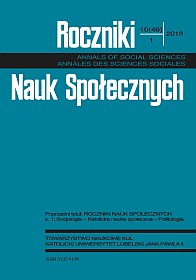Identity of the Normative Actor and the Strategies of the European Union’s Presence in the International Relations
Abstract
The European Union's (EU) global strategy in foreign affairs of June 2016 and the recent reform of the treaty (Lisbon Treaty) in the field of foreign cooperation might be understood as an attempt to redefine discourse on EU's international identity. Evolution in terms of strategic assumptions, institutional tools as well as of international instruments may indicate on the need for a new perspective on the normative power, which has been the basis for discourse on the identity of the EU in international relations so far. These changes seem proof the thesis that EU wants to become independent, self-reliant actor with military tools of international influence as well as pursuing their own interests in international space, still referring to principles, values and international law.
References
Barcz J., Problem modelu prawnego procesu integracji europejskiej i zarządzania w ramach Unii Europejskiej, w: Instytucje i prawo Unii Europejskiej, red. J. Barcz, M. Górka, A. Wyrozumska, Warszawa: Wolters Kluwer 2015.
Bezpieczna Europa w lepszym świecie. Europejska strategia bezpieczeństwa, http://www.consilium.europa.eu/uedocs/cmsUpload/031208ESSIIPL.pdf [dostęp: 06.06.2017].
Borkowski P., Tożsamość międzynarodowa UE w świetle koncepcji ról, „Przegląd Europejski” 2009, nr 1, s. 69-84.
Bretherton Ch., Vogler J., The European Union as a Global Actor, New York: Routledge 2006.
Brubaker R., Cooper F., Beyond ‘identity’, „Theory and Society” 2000, nr 29, s. 1-47.
Declaration on European Identity, „Bulletin of the European Communities” 1973, No 12, Luxembourg: Office for official publications of the European Communities, s. 118-122.
Duchêne F., Europe’s Role In World Peace, w: Europe Tomorrow: Sixteen Europeans Look Ahead, ed. R.J. Mayne, London: HarperCollins Distribution Services 1972, s. 32-47.
Erikson E., Identity: Youth and Crisis, New York: W.W. Norton Company 1968.
European Integration and Supranational Governance, eds. W. Sandholtz, A. Stone Sweet, Oxford: Oxford University Press, s. 297-317.
Europejska Strategia Bezpieczeństwa Bezpieczna Europa w lepszym świecie, www.consilium.europa.eu/uedocs/cmsUpload/031208ESSIIPL.pdf [dostęp: 26.06.2017].
Konkluzje Rady Europejskiej, Bruksela, 26.06.2015, EUCO 22/15, https://europa.eu/globalstrategy/en/european-council-conclusions-june-2015 [dostęp: 23.01.2017].
Koziej S., Potrzeba nowelizacji strategii bezpieczeństwa Unii Europejskiej, www.bbn.gov.pl/.../Potrzeba_nowelizacji_strategii_bezpieczenstwa_Unii_Europejskiej, s. 1 [dostęp: 25.06.2017].
Łoś-Nowak T., Organizacje międzynarodowe – ewolucja w kierunku samodzielności w polityce i stosunkach międzynarodowych, Wrocław: Wydawnictwo Uniwersytetu Wrocławskiego 2004.
Manners I., Normative Power Europe: A Contradiction In Terms?, „JCMS” 40 (2002), nr 2, s. 235-258.
Manners I., Normative Power Europe: The International Role of the EU, http://aei. pitt.edu/7263/1/002188_1.PDF, s. 1-30 [dostęp: 01.09.2014].
Manners I., The Concept of Normative Power In Word Politics, „DIIS Brief” maj 2009, <http://subweb.diis.dk/graphics/Publications/Briefs2009/B09_maj__Concept_Normative_Power_World_Politics.pdf> [dostęp: 20.09.2014].
Manners I., Normative power Europe reconsidered: beyond the crossroads, „Journal of European Public Policy” 13(2006), nr 2, s.182-199.
Marcusen M., Risse T., Engelman-Martin D., Knopf H.J., Rocher K., Constructing Europe? The Evolution of Nation-State Identities, w: The Social Construction of Europe, ed. T. Christiansen, K.E. Jørgensen, A. Wiener, London: SAGE 2001, s. 101-121.
Prawo Unii Europejskiej – zagadnienia systemowe oraz prawo materialne i polityki, red. J. Barcz, Warszawa: Wydawnictwo Prawo i Praktyka Gospodarcza 2006.
Ruszkowski J., Ponadnarodowość w systemie politycznym Unii Europejskiej, Warszawa: Wolters Kluwer 2015.
Smith K., Still “civilian power EU”?, „European Foreign Policy Unit Working Paper” 2005, nr 1, http://personal.lse.ac.uk/SMITHKE/EFPUworkingpaper2005-1.pdf, s. 1-19 [dostęp: 29.08.2015].
Skolimowska A., Normatywna potęga Unii Europejskiej w obliczu umiędzynarodowionych konfliktów wewnętrznych, Warszawa: Elipsa 2015.
Skolimowska A., Unia Europejska jako organizacja międzynarodowa, Warszawa: Cedewu 2015.
Solana J., Identity and foreign Policy, „ESDP” 2007, nr 3(9), http://www.iss.europa.eu/uploads/media/ESDP_newsletter_003.pdf, s. 9-10 [dostęp: 25.06.2017].
Traktat o Unii Europejskiej, Dz.U. C 191 z 29.7.1992, https://europa.eu/european-union/sites/europaeu/files/docs/body/treaty_on_european_union_en.pdf [dostęp: 04.04.2017].
Traktat o Unii Europejskiej – tekst skonsolidowany uwzględniający zmiany wprowadzone Traktatem z Lizbony – Dz.U. C 326 z 26.10.2012, [dostęp: 13.03.2010].
Weaver O., The EU as a Security Actor: Reflections from a Pessimistic Constructivist on Post-Sovereign Security Orders, w: International Relations Theory and the Politics of European Integration, ed. M. Kelstrup, M.C. Williams, London: Routledge, s. 250-295.
Wendt A., Społeczna teoria stosunków międzynarodowych, Warszawa: Wydawnictwo Naukowe Scholar 2008, s. 211.
Wspólna wizja, wspólne działanie: Silniejsza Europa Globalna strategia na rzecz polityki zagranicznej i bezpieczeństwa Unii Europejskiej, http://eeas.europa.eu/archives/docs/top_stories/pdf/eugs_pl_.pdf [dostęp: 06.06.2017].
Copyright (c) 2018 Roczniki Nauk Społecznych

This work is licensed under a Creative Commons Attribution-NonCommercial-NoDerivatives 4.0 International License.


